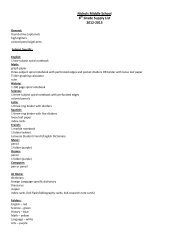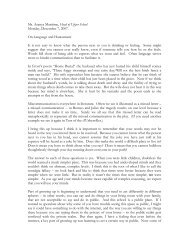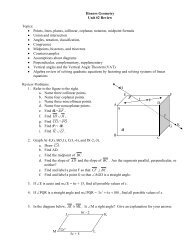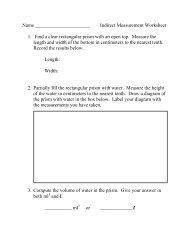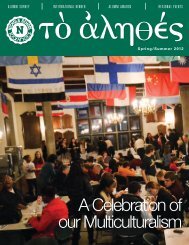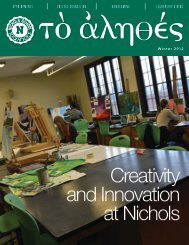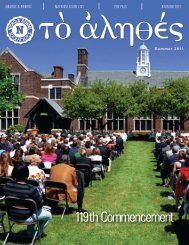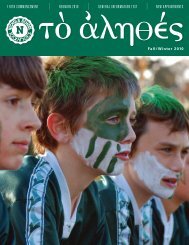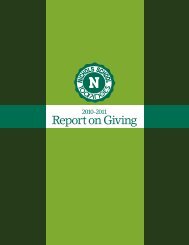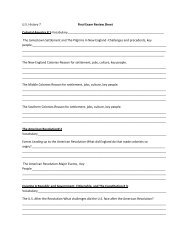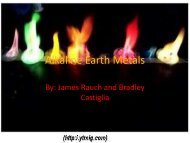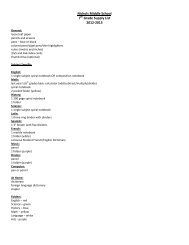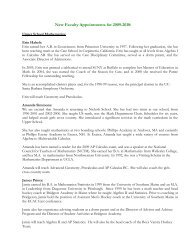Haiku is an unrhymed form of Japanese verse. It ... - Nichols School
Haiku is an unrhymed form of Japanese verse. It ... - Nichols School
Haiku is an unrhymed form of Japanese verse. It ... - Nichols School
You also want an ePaper? Increase the reach of your titles
YUMPU automatically turns print PDFs into web optimized ePapers that Google loves.
FORMS OF POETRY:<br />
<strong>Haiku</strong> <strong>is</strong> <strong>an</strong> <strong>unrhymed</strong> <strong>form</strong> <strong>of</strong> Jap<strong>an</strong>ese <strong>verse</strong>. <strong>It</strong> cons<strong>is</strong>ts <strong>of</strong> 3 lines. There are 5 syllables in the<br />
first line, seven syllables in the second line, <strong>an</strong>d five syllables in the third line.<br />
The geese flying south<br />
In a row long <strong>an</strong>d V-shaped<br />
Pulling in winter.<br />
(5 syllables)<br />
(7 syllables)<br />
(5 syllables)<br />
-- “Fall” by Sally Andersen<br />
T<strong>an</strong>ka <strong>is</strong> <strong>an</strong>other <strong>unrhymed</strong> <strong>form</strong> <strong>of</strong> Jap<strong>an</strong>ese <strong>verse</strong>. T<strong>an</strong>ka has five lines. The first three lines<br />
are like haiku; the last two lines have seven syllables.<br />
Just out <strong>of</strong> earshot,<br />
(5 syllables)<br />
the periodic blinking (7)<br />
<strong>of</strong> a night airpl<strong>an</strong>e, (5)<br />
not quite far enough away (7)<br />
to be as close as the stars (7)<br />
-- by Gerald St. Maur<br />
There are other <strong>form</strong>s <strong>of</strong> t<strong>an</strong>ka in which the lines are shorter. (The poet <strong>is</strong> only counting the<br />
accented syllables.)<br />
F<strong>is</strong>h guts<br />
stain the rowboat’s pl<strong>an</strong>ks;<br />
by the lake’s edge<br />
a child <strong>is</strong> throwing stones<br />
into the deep.<br />
-- by Penny Harter<br />
Cinquain has five lines. There are two syllables in the first line, four syllables in the second<br />
line, six in the third line, eight in the fourth line, <strong>an</strong>d two in the fifth line.<br />
Oh, cat<br />
(2 syllables)<br />
are you grinning (4)<br />
curled in the window seat (6)<br />
as sun warms you th<strong>is</strong> December (8)<br />
morning? (2)<br />
-- by Paul B. J<strong>an</strong>eczko<br />
A quatrain cons<strong>is</strong>ts <strong>of</strong> four lines with a rhyme scheme.<br />
Tyger Tyger, burning bright,<br />
In the forests <strong>of</strong> the night;<br />
What immortal h<strong>an</strong>d or eye,<br />
Could frame thy fearful symmetry?<br />
-- by William Blake
A narrative poem tells <strong>an</strong> exciting story with a minimum <strong>of</strong> words. Narrative poems move<br />
quickly, are <strong>of</strong>ten dramatic, <strong>an</strong>d have rhythm <strong>an</strong>d rhyme. Narrative poems have setting,<br />
character, plot, <strong>an</strong>d theme (just like a short story).<br />
The Eagle<br />
He clasps the crag with crooked h<strong>an</strong>ds;<br />
Close to the sun in lonely l<strong>an</strong>ds,<br />
Ringed with the azure world, he st<strong>an</strong>ds.<br />
The wrinkled sea beneath him crawls;<br />
He watches from h<strong>is</strong> mountain walls,<br />
And like a thunderbolt he falls.<br />
-- Lord Alford Tennyson<br />
Free <strong>verse</strong> <strong>is</strong> a poem that has much rhythmic variation, irregular or unusual st<strong>an</strong>zas, <strong>an</strong>d either<br />
no rhyme or a loose rhyme pattern.<br />
Absolutes<br />
black on white<br />
crow in snow<br />
hunched<br />
wet lump<br />
on brittle br<strong>an</strong>ch<br />
remembering warmth<br />
remembering corn<br />
m<strong>is</strong>erable<br />
as life<br />
<strong>is</strong><br />
black on white<br />
-- Gustave Keyser



